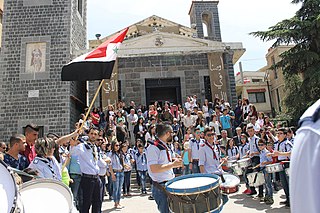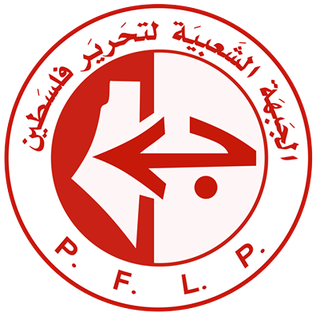Related Research Articles

Robert William Fisk was an English writer and journalist. He was critical of United States foreign policy in the Middle East, and the Israeli government's treatment of Palestinians.

Hassan Nasrallah was a Lebanese cleric and politician who served as the secretary-general of Hezbollah, a Shia Islamist political party and militia, from 1992 until his assassination in 2024.

Arab Christians are ethnic Arabs, Arab nationals, or Arabic speakers, who follow Christianity. The number of Arab Christians who live in the Middle East was estimated in 2012 to be between 10 and 15 million. Arab Christian communities can be found throughout the Arab world, but are concentrated in the Eastern Mediterranean region of the Levant and Egypt, with smaller communities present throughout the Arabian Peninsula and North Africa.
The Green Line or 1949 Armistice border is the demarcation line set out in the 1949 Armistice Agreements between the armies of Israel and those of its neighbors after the 1948 Arab–Israeli War. It served as the de facto borders of the State of Israel from 1949 until the Six-Day War in 1967, and continues to represent Israel’s internationally recognized borders with the two Palestinian territories: the West Bank and the Gaza Strip.

Abdel Bari Atwan is a Palestinian-born British journalist and the editor-in-chief of Rai al-Youm, an Arab world digital news and opinion website. Previously he was the editor-in-chief of the London-based pan-Arab newspaper Al-Quds Al-Arabi from the founding of the paper in 1989 until July 2013.

The Arab–Israeli conflict is the phenomenon involving political tension, military conflicts, and other disputes between various Arab countries and Israel, which escalated during the 20th century. The roots of the Arab–Israeli conflict have been attributed to the support by Arab League member countries for the Palestinians, a fellow League member, in the ongoing Israeli–Palestinian conflict; this in turn has been attributed to the simultaneous rise of Zionism and Arab nationalism towards the end of the 19th century, though the two national movements had not clashed until the 1920s.

Husayni is the name of a prominent Palestinian Arab clan formerly based in Jerusalem, which claims descent from Husayn ibn Ali.
Nashashibi is the name of a prominent Palestinian Arabic family based in Jerusalem.
The Palestinian people are an ethnonational group with family origins in the region of Palestine. Since 1964, they have been referred to as Palestinians, but before that they were usually referred to as Palestinian Arabs. During the period of the British Mandate, the term Palestinian was also used to describe the Jewish community living in Palestine.
Just Journalism was a UK-based research organisation and pressure group, which commented on Israel and the Middle East. Its stated goals were to focus "on how Israel and Middle East issues are reported in the UK media." The organisation published online analyses in response to news stories, reported on "long-term trends", and opinion pieces for external publications.
Following are timelines of the history of Ottoman Syria, taken as the parts of Ottoman Syria provinces under Ottoman rule.

The September 11 attacks were carried out by 19 hijackers of the Islamist militant organization al-Qaeda. In the 1990s, al-Qaeda leader Osama bin Laden declared a militant jihad against the United States, and issued two fatawa in 1996 and 1998. In the 1996 fatwa, he quoted the Sword Verse. In both of these fatawa, bin Laden sharply criticized the financial contributions of the American government to the Saudi royal family as well as American military intervention in the Arab world.

Al Mayadeen is a Lebanese pan-Arabist satellite news television channel based in the city of Beirut. Launched on 11 June 2012, it has news reporters in most of the Arab countries. In the pan-Arabist television news market, it competes against Qatar-owned Al Jazeera and Saudi-owned Al Arabiya, and also against Sky News Arabia and BBC News Arabic. At the time it was founded, most of the channel's senior staff were former correspondents and editors of Al Jazeera. Al Mayadeen has widely been categorized as pro-Hezbollah, pro-Bashar al-Assad and Iran-aligned.

The Popular Front for the Liberation of Palestine is a secular Palestinian Marxist–Leninist and revolutionary socialist organization founded in 1967 by George Habash. It has consistently been the second-largest of the groups forming the Palestine Liberation Organization, the largest being Fatah.
Azmi Bishara is an Arab-Israeli public intellectual, political philosopher and author. He is presently the General Director of the Arab Center for Research and Policy Studies and the Chair of the Board of Trustees of the Doha Institute for Graduate Studies.

The Arab Higher Committee or the Higher National Committee was the central political organ of Palestinian Arabs in Mandatory Palestine. It was established on 25 April 1936, on the initiative of Haj Amin al-Husayni, the Grand Mufti of Jerusalem, and comprised the leaders of Palestinian Arab clans and political parties under the mufti's chairmanship. The committee was outlawed by the British Mandatory administration in September 1937 after the assassination of a British official.

Palestinian nationalism is the national movement of the Palestinian people that espouses self-determination and sovereignty over the region of Palestine. Originally formed in the early 20th century in opposition to Zionism, Palestinian nationalism later internationalized and attached itself to other ideologies; it has thus rejected the occupation of the Palestinian territories by the government of Israel since the 1967 Six-Day War. Palestinian nationalists often draw upon broader political traditions in their ideology, such as Arab socialism and ethnic nationalism in the context of Muslim religious nationalism. Related beliefs have shaped the government of Palestine and continue to do so.
References
- ↑ Sharif is Co-founder
- ↑ Dalila Mahdawi (2 January 2009), "Group looks to alter media bias on Arab world", The Daily Star (Lebanon) , retrieved 22 January 2014
- ↑ "Palestinian intellectuals insist on full withdrawal", Middle East News Online, 22 March 2000, archived from the original on 1 February 2014, retrieved 22 January 2014
- ↑ "Letter: Support for Israel", The Independent , 15 October 2001, archived from the original on 22 January 2014, retrieved 22 January 2014
- ↑ "2008 Media Awards | the Next Century Foundation". Archived from the original on 12 April 2009. Retrieved 7 June 2009.
- ↑ "On Syria's History of Inclusiveness". CivilNet. 22 November 2012. Retrieved 7 September 2015.